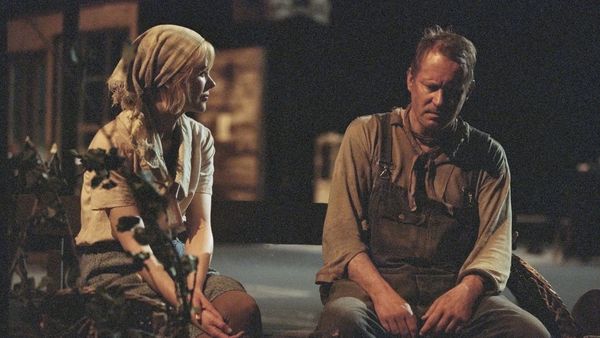Eye For Film >> Movies >> Dogville (2003) Film Review
Dogville
Reviewed by: Chris

I don't think my mum actually ever forgave father. It wasn't so much what he did. More the fact that she devoted 15 years of life to a someone she was not in love with. Altruism can certainly be character building. Yet do most people inwardly want something in return? Self-sacrifice for its own sake can be foreign to our western way of thinking.
The wonderful Nicole Kidman is Grace, a very attractive young woman. She's also a fugitive, escaping from gangsters.

Seeking refuge, Grace enters Dogville. It's a sad, 1930s hamlet in the Rocky Mountains. She will do odd jobs for the inhabitants in return for sanctuary. At first they refuse - very arrogantly - they don't need anything. But amateur philosopher and moderniser Tom intercedes. Soon, she is gratefully doing something for everyone. But are the townsfolk risking all by sheltering her? They soon become self-righteous, oppressive, and abusive, piously proclaiming that "it is for her own good."
And Grace harbours a terrible secret...
The audience of Dogville is taken through increasingly nasty, almost unsolvable moral dilemmas. Forgiveness, justice, tolerance, and conceit. They all culminate in a traumatic and disturbing finale.
This highly original movie is not an easy watch - and, be warned, it lasts for three hours. The first 30 minutes can seem tedious and affected. A few later scenes are exceedingly graphic and quite hard to watch. It will surprise you, it may distress you, and it may cause you to ask questions about yourself. It may even make you walk out in the middle (though hopefully you won't!) Dogville unravels those psychological mechanisms which expose people's real natures. And it doesn't necessarily offer answers.
Grace, of course, is not only the name of the main character, but also a 'state of grace' that descends on this unsuspecting town. Heavy symbolism in almost everything is strengthened by unusual cinematography. It is shot on a bare sound stage with markings for walls, bushes and the dog. Such avant-garde theatrical style is unnerving at first, but after half an hour or so one just absorbs it. We become unaware of it, the way one does, say, with subtitles. Dogville, indicated almost entirely by chalk lines, soon feels real and solid. Whether or not this justified relies on how much you buy into the mythology being ingeniously created and depicted (though my opinion is that this is one of those rare cases where revolutionary technique has been completely and holistically justified). Minimalism, literary chapters and omnipresent narration (delivered by John Hurt) help us to focus on Dogville-as-parable rather than Dogville-as-thriller.
As the plot thickens, we are forced to watch the emotional isolation and degradation of Grace, neighbours turning a blind eye. We are awkwardly conscious of ethical tensions: the self-justification of the townsfolk, Grace's uncomplaining nature, then ultimately (and perhaps uncomfortably) the implications of such dynamics in our own world.
The film has a strong (though not explicit) comment on attitudes shaped by New Testament fundamentalism, of 'turning the other cheek,' versus Old Testament 'eye for an eye' philosophy. But the bigger puzzle is how valid these are, how far they can be taken. More overt comments are directed at foreign and domestic policy, and many people from the USA have taken offence at the thinly-veiled allusions to America.
Dogville is gut-wrenching in a way that stays with us long after we stop watching. It is a film for serious filmgoers rather than those wanting easily-digestible entertainment. In its own way, Dogville is a monumental achievement, for its innovative techniques, its effectiveness and its impact on its audience - not to mention its implications on the world we live in. One of the most mature and arresting works made by Danish Dogme founder Lars von Trier, it is seen by many as a modern masterpiece (if also a readily misunderstood one).
On the arguments that raged over it, von Trier said "If there is a moral it is that good and evil exists in everybody and circumstances can bring it out." But to reach the states portrayed by the characters, he nudged them towards trauma so powerfully that they had a 'confessions' box on set and appeared visibly disturbed by what they had gone through.
Political comment, satire, religious metaphor, an expose of psychological forces within each of us, a feminist diatribe, or pure cinematic art? Dogville is probably all of these. Or is it just pretentious twaddle? Critics and scholars worldwide have been divided and will continue to be divided on Dogville, but its place in cinema history seems assured, as does its place in the annals of Kidman's greatest works.
My parents, by the way, both found their ideal partners in later marriages. My father left first and so mum claimed the moral high ground. But I think our early days of near-poverty were more character forming than any self-sacrifice. Poverty is often an absence of power. When you come out of it you've learnt the effect that other people's power on you has and, hopefully, used that to do better rather than beat up yourself or others with it. Survivors, for good or ill, rarely feel beholden. As Grace says, "Some things you have to do yourself."
Reviewed on: 07 May 2007


















